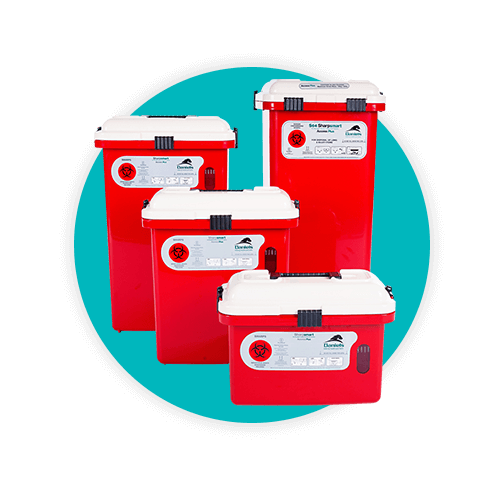Montana Medical Waste Disposal Services
Daniels Health is the leading expert in compliance, clinical containment and environmentally responsible waste management services. Transparent pricing, customized scheduling, immediate cost reduction.
The Daniels Difference
- We provide medical waste containers designed by clinicians for clinicians!
- All containers sanitized through a world-leading robotic washing / decontamination process.
- It is our drivers and our trucks that will service your facility, no third party hauler risk
- We areup front with our costs and transparent with our contracts
- Scheduling that supports your practice – you pay only for what you need
- Eliminate disposal-related needlestick injuries with our advanced sharps safety systems
- Eliminate the purchase, disposal costs and landfill of one-time-use disposable containers
Solutions
- Regulated Medical Waste Services
- Biohazardous Sharps Services
- Pharmaceutical Waste Services
- Chemotherapy and Hazardous Waste Services
- Onsite and online compliance and education
Safety vs Cardboard Box
Daniels’ clinical container movement is changing the industry’s perception of how medical waste should be disposed and transported.
The practice of red bags and cardboard boxes for medical waste management often results in leakage, cross contamination, and hygiene risks associated with hand-touch use. At Daniels, we look at medical waste management differently with containers designed specifically for the clinical environment; safety, security, ease of movement, contamination-free, overfill protection, bagless, touchless… we proudly shift the goalposts of what safe medical waste management should look like in a healthcare setting.
Greener Medical Waste Treatment
Daniels robotic washing technology achieves greater microbiological efficacy in container washing than any other system
Sharpsmart eliminates up to 99% reduction in the manufacture of containers. Significant reduction in Greenhouse Gas Emissions and landfill waste. Washing process recycles water to reduce ecological impact. Achieves high-level disinfection while avoiding the use of environmentally harmful chemicals.
Sharpsmart. World Leading Sharps Safety Technology
Peer reviewed in four independent studies, clinically proven to reduce needlestick Injuries by up to 87%, and relied on by healthcare facilities around the world, the Sharpsmart system is driven by a single objective – To Save Lives. Designed with 13 safety features, manufactured with needle-impenetrable plastic, a gravity balanced safety tray for risk-free sharps disposal, and a built-in overfill protection mechanism, the Daniels Sharpsmart is the most advanced sharps container system in the world.
Daniels Education Services
Partnering to improve safety, segregation and cost optimization
Daniels employs a blended learning approach to education that accommodates multiple learning styles. Versatile and intuitive, our education platforms serve not only to impart knowledge, but also to inspire conscious and actionable disciplines in day-to-day practices. Through education posters, one-on-one training, e-learning modules and group education, we impart our expertise in healthcare waste management to help you reduce your costs and minimize environmental impact.
How We Serve You
Across 6 countries, Daniels has become a brand name synonymous with healthcare innovation and service
In 39 years Daniels have become experts in delivering solutions for the niche requirements of healthcare. Today over 125,000 services are fulfilled annually across the United States by Daniels owned and operated fleet. From small practices to large medical facilities, our scalable business model ensures that every customer receives:
- Timely scheduled services with clear transparent communication
- Minimum disruption to patient care
- Safety and Security underpinning all biohazardous waste handling practices
- A positive and friendly customer experience
- Cost-effective customized solutions that guarantee efficiencies and maximize savings
Let's Talk!
Your time is valuable, and we don’t want to play hard to get. You can either phone us directly on the details listed on our contact page, or feel free to fill out this short form and one of our team members will get back to you as quickly as possible.
 Daniels’ range of
Daniels’ range of 
 and has the largest variety of mammals in America including elk, wolves, moose, deer, bison, trumpeter swans, grizzly bears, antelope and wild buffalo.
and has the largest variety of mammals in America including elk, wolves, moose, deer, bison, trumpeter swans, grizzly bears, antelope and wild buffalo.